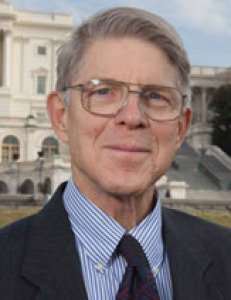MINNEAPOLIS, Jan. 23, 2015 – The American Midwest faces “economic disruptions as climate change advances, reduces labor productivity, and shifts agricultural production patterns.” The threats include the potential shift of “growing patterns for major commodity crops to the north …putting individual farming communities at risk.”
Those are some of the stark warnings in “Heat in the Heartland: Climate Change and Economic Risk in the Midwest,” a business-focused panel’s report released Friday in Minneapolis. This report builds on an earlier Risky Business report released last August, “The Economic Risks of Climate Change in the United States.”
Unveiling the Midwest report at the Economic Club of Minnesota, former U.S. Treasury Secretary Hank Paulson warned that “climate change poses a tremendous threat to the key sectors of the Midwest economy, particularly manufacturing and agriculture.” As co-chair of the non-profit Risky Business Project which published the report, Paulson said “We’ve got time to avoid the worst outcomes if we act soon.”
Speaking as a Midwesterner who grew up on a farm in Barrington, Illinois, Paulson called on agriculture and business leaders to “play a bigger role” in lobbying to have government make the policy changes needed to deal with climate change. He added that “Our business leaders, our cities, and our investment community need to focus on these risks and act now before it's too late.”
The report warns that “If we continue on our current emissions path without significant adaptation, by the end of the century the Midwest will likely see overall agricultural losses for corn and wheat of 11 percent to 69 percent across the region as a whole, with a 1-in-20 chance of more than an 80 percent decline.” Cargill Executive Chairman Greg Page, a Risky Business Project Risk Committee member, said that “given the importance of the Midwestern United States to the world's agricultural production, it would be irresponsible to dismiss these projections lightly.”
Page, who grew up in Bottineau, North Dakota, and, like Paulson, remains thoroughly versed in Midwestern agriculture, said farmers need to “start now, be thoughtful, and plan now for what we think are probable outcomes.” He listed one of those probabilities facing the Midwest as “500-year flooding every three or four years.”
Among hopeful signs, Page listed farmers taking action by reducing greenhouse gas emissions through more efficient management practices and adding anaerobic digesters to their operations. He said that along with important farm-level achievements, “to preserve and strengthen the global food system’s resilience in the face of climate change, we need to invest in innovation, maintain open borders, and rapidly and responsibly disseminate agricultural technology that both improves productivity and protects the environment.” He said he hopes the Midwest report will “encourage business and political leaders in the region to think long-term about the actions we can take starting today to prepare the Midwest to deal with a range of climate uncertainties and scenarios.”
Paulson said a major achievement has been the Obama administration signing an emissions-reduction agreement with China. He said the agreement “increases the odds that will see other nations follow suit” and boosts prospects for success in the December 2015 global climate summit in Paris.
After announcing the report Friday, Cargill’s Greg Page told Agri-Pulse the report is addressed to the business community because it understands “the task of risk management and risk mitigation” better than politicians do.
The Midwest report focuses on eight states: Illinois, Indiana, Iowa, Michigan, Minnesota, Missouri, Ohio and Wisconsin. It provides open-source data “by metropolitan region, providing businesses and governments with the ability to better understand the likely impact climate change will have across the Midwest’s many interconnected cities, towns and counties.”
 The report concludes that “if we act today to move onto a different path, we can still avoid many of the worst impacts of climate change, particularly those related to extreme heat. We are fully capable of managing climate risk, just as we manage risk in many other areas of our economy and national security – but only if we start to change our business and public policy decisions today.”
The report concludes that “if we act today to move onto a different path, we can still avoid many of the worst impacts of climate change, particularly those related to extreme heat. We are fully capable of managing climate risk, just as we manage risk in many other areas of our economy and national security – but only if we start to change our business and public policy decisions today.”
The report calls on “Midwest business leaders and investors to get in the game and rise to the challenge of addressing climate change.” It explains that “just as the investments and economic choices we made over the past several decades have increased our current vulnerability to climate change, so will the choices we make today determine what our nation looks like over the next 25 years, at mid-century, and by 2100. . . This is not a problem for another day. The investments we make today – this week, this month, this year – will determine our economic future.”
To create a better outcome, the Heartland report recommends:
- “Changing everyday business practices to become more resilient.”
- “Incorporating risk assessment into capital expenditures and balance sheets."
- “Instituting policies to mitigate and adapt to climate change.”
# 30

